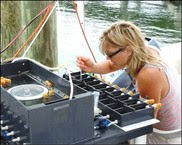Highlights

Watching marine animals in their natural habitats can promote conservation and respect for animals and their environment. But irresponsible human behavior can disturb animals, damage habitats, and result in injury to animals and people. Before spending time on or near the ocean, know the regulations and guidelines for viewing and approaching marine mammals and sea turtles.
|

NOAA Fisheries and NOAA’s National Sea Grant College Program have announced the eight recipients of 2019 Fisheries-Sea Grant Joint Fellowships. The program is a focused workforce development effort to train highly qualified professionals for NOAA’s science-based approach to fisheries management.
|
|
|
Alaska

The ocean is vast and fish swim—which can make it challenging to survey fish populations to inform management decisions. A new NOAA Fisheries study demonstrates that unmanned surface vehicles can expand the range and duration of ship-based acoustic fish surveys.
|

The Presidential Early Career Award for Scientists and Engineers (PECASE) is the highest honor bestowed by the U.S. Government on outstanding scientists and engineers in the early stages of their careers. The Alaska Fisheries Science Center is proud to have 2019 PECASE recipient Elizabeth Siddon on the team.
|

Northern fur seals are known to breed on only a few isolated islands in the North Pacific Ocean, with most of the U.S. population limited to the Pribilof Islands. Follow our scientists as they study this unique species.
|
|
|
West Coast

By replacing and upgrading the only road connection to Washington’s Marrowstone and Indian Islands, NOAA and partners are restoring the connection between Kilsut Harbor and Oak Bay, an important migratory pathway for juvenile endangered salmon.
|
|
|
Southeast

The Florida Trustee Implementation Group for the Deepwater Horizon Natural Resource Damage Assessment invites you to submit project ideas for restoration in Florida, due September 20. Restoration Plan 2 will focus on restoring habitat on federally managed lands; recovering oysters, sea turtles, marine mammals, and birds; and enhancing recreational fishing opportunities.
|

The Open Ocean Trustee Implementation Group for the Deepwater Horizon Natural Resource Damage Assessment approved new monitoring and adaptive management activities to help better understand environmental conditions that impact marine mammals injured by the 2010 oil spill.
|
|
|
Greater Atlantic

After years of pollution from industrial waste, Michigan’s Manistique River was listed as one of the most environmentally degraded areas in the Great Lakes region. Today, NOAA is supporting the final stage of restoration work needed to remove the river from this list, restore habitat for native fish species, and support a safe and healthy waterway for local communities to use.
|

Our summer Ecosystem Monitoring cruise is in full swing. Since the 1970s, the “EcoMon” cruise has monitored water temperature and salinity, distribution of fish larvae and eggs, and zooplankton across the continental shelf from North Carolina to the Gulf of Maine. Among the diverse science crew is NOAA Teacher at Sea Ragupathy Kannan from Arkansas. |

By September 23, please submit your comments on an advance notice of proposed rulemaking that sets a lobster fishery control date of April 29, 2019. The control date may be used to establish eligibility criteria in future management measures to reduce the threats to North Atlantic right whales.
|

Every month the Northeast Fisheries Science Center features a staff member from one of the Center’s five laboratories. In the August installment, meet Shannon Meseck, a research chemist at the Milford Lab in Connecticut.
|

Zachary Fyke is the new Observer Compliance Liaison in the Northeast Fisheries Science Center’s Fisheries Sampling Branch. Zach, a former fisheries observer himself, will take the lead in helping ensure compliance with monitoring regulations and resolving issues that arise between commercial fishing vessel operators and federal fisheries observers.
|
|
|
Upcoming Deadlines
August 31: Applications due for open seats on New England Fishery Management Council advisory panels.
September 20: Proposals due for the 2020–2021 Sea Scallop Research Set-Aside Program.
September 29: Proposals due for the 2020–2021 Monkfish Research Set-Aside Program.
October 31: Proposals due for 2020 Species Recovery Grants to States.
October 31: Proposals due for 2020 Species Recovery Grants to Tribes.
November 1: Abstracts due for the 2020 Milford Aquaculture Seminar.
|
|
Upcoming Events
August 29–September 30: Free tours every weekday at NOAA Fisheries’ Ted Stevens Marine Research Institute in Juneau, Alaska.
September 4–5: Atlantic Highly Migratory Species Advisory Panel meeting in Silver Spring, Maryland, open to the public and broadcast via webinar.
September 5–6: Meeting of the Advisory Committee to the U.S. Section to the International Commission for the Conservation of Atlantic Tunas (ICCAT) in Silver Spring, Maryland, open to the public and broadcast via webinar.
September 4 and 17: Two free Protected Species Safe Handling, Release, and Identification workshops in Rhode Island and Florida.
September 9–10: Two public hearings on the proposed Atlantic Surfclam and Ocean Quahog Excessive Shares Amendment, hosted by the Mid-Atlantic Fishery Management Council.
September 10–24: Three engagement sessions hosted by the Northeast Fisheries Science Center’s Cooperative Research Branch in locations in New Jersey and Virginia.
September 11–18: Pacific Fishery Management Council meeting in Boise, Idaho.
September 12: Free Atlantic Shark Identification workshop in Panama City Beach, Florida.
September 16–20: South Atlantic Fishery Management Council meeting in Charleston, South Carolina.
September 23–November 4: Five informational sessions on proposed changes to the Florida Keys National Marine Sanctuary.
September 24–26: New England Fishery Management Council meeting in Gloucester, Massachusetts.
|
|
| |
|

No comments:
Post a Comment